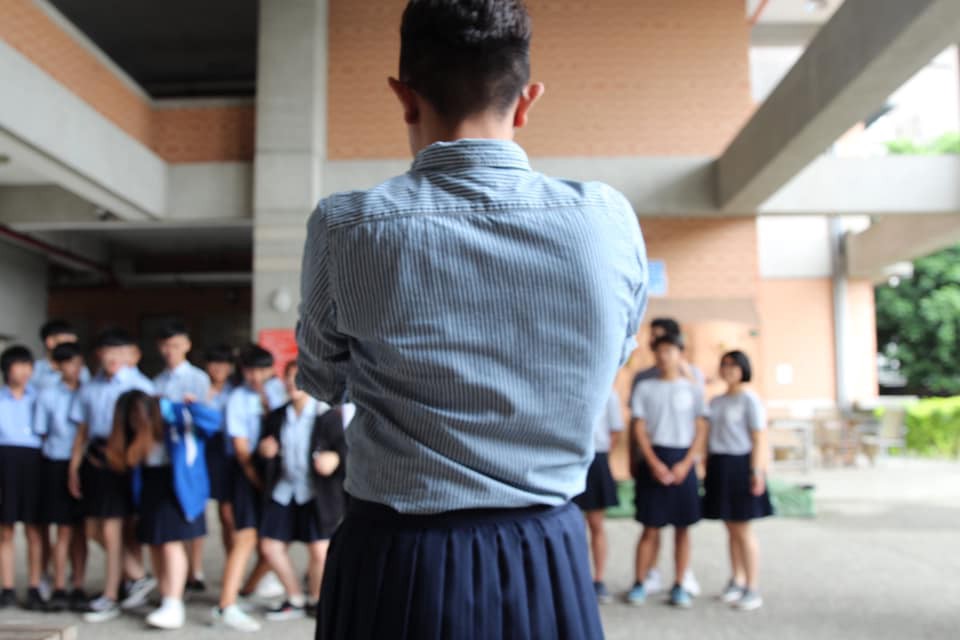 Authorized by Panchiao Senior High School Student Association
Authorized by Panchiao Senior High School Student Association
After Taiwan legalized same-sex marriage, a new gender equality movement launched in June 2019. New Taipei Municipal Banqiao Senior High School (????) decided that its male students would be allowed to wear skirts to school. School officials said that they were not encouraging boys to wear skirts but, rather, only respecting the free will of their students. A Ministry of Education spokesman welcomed the decision, saying that it was probably the first senior high school in Taiwan to have adopted such measures to break gender stereotypes through a process of democratic consultation. But, do you know the significance of this great improvement in Taiwanese context? And, is there any other country in Asia that is also allowing its male students to wear skirts to school?
?Girls wear pink, boys wear blue; girls wear dresses, boys wear suits.? These are just some of the gender stereotypes associated with school uniforms. In the past, these stereotypes were very concrete, and very rarely did people ?cross-dress.?? A stereotype is a way people classify things to quickly process information. However, stereotypes can be harmful if we judge people too soon without even understanding them. For example, when seeing someone wearing a skirt, we might assume that the person is female, tender as well as fragile; when seeing someone wearing pants, we will consider him strong and powerful. Because of these stereotypes, we often ignore people?s personalities, distinctions, and merits.
Fortunately, there are plenty of companies and organizations well aware of the harmful stereotypes behind clothing. Nowadays, allowing male students to wear skirts does not imply an attempt to feminize men or masculinize women, but rather to eliminate traditional labels for both genders. The decision by Banqiao Senior High School to lift the ban on boys wearing skirts has caused a ripple effect. For example, in August this year, the most prestigious school in Taiwan, Municipal Jianguo High School, followed suit by allowing the casualwear of the school to include skirts. Furthermore, other well-known schools like HSNU, Taichung First Senior High School and Tainan First Senior High School have also noted the trend and placed the lifting of these bans on their agenda. Such movements serve as testaments to the fact that the liberalization of dress codes and changing of gender stereotypes is bearing fruit. And, as an increasing number of people acknowledge the significance of gender equality, these movements are expected to gain momentum and result in more schools lifting the bans on the school uniforms.
So, how will New Taipei Municipal Banqiao Senior High School follow up on this policy? We can draw from experiences in Japan for guidance regarding further policy implementation. At Kashiwanoha Elementary School, middle schoolers regardless of their gender have been allowed to freely choose among the wearing of slacks, skirts, neckties, or chest ribbons since last spring. Originally, the school had considered to lift the requirement of wearing a uniform, but a survey found that most parents of incoming students still wanted their children to wear one. Hence, a committee was formed to decide what sort of uniform the school should have, and a decision was reached that took into consideration LGBT youths. To help LGBT students feel comfortable with what they are wearing in class, the committee decided that every boy and girl would be able to choose to wear slacks or a skirt.
In today?s world, there is no longer a strict standard governing what it means to dress like a boy or girl. Just like gender itself, there?s flexibility in dressing. So, no matter what your gender is and no matter how masculine or feminine you are, wear what you want to wear because the stereotypes don?t matter.
Duoduo Butterfly: Hsing Jia-Hui and Her Picture Book Revolution
Duoduo Butterfly is the first picture book on sexual assault education in Taiwan, and a campaign is raising fund to cultivate trainers regarding sexual assault education.
Is There Free The Nipple Movement in Taiwan?
In 2015, a campaign in Taiwan tried to fight for women?s bodily autonomy, yet disrupted by policies of social media platforms and concerns from the society.
Menstruation Facts: What?s Wrong with Having a Period?
Reviewing stories about menstruation throughout history, have we really eliminated period stigma successfully?

Author: Judy Chen
Hi everyone! I am Judy, a senior at National Taiwan University. I have a great interest in exploring the world, and working on improving the equality of both genders.


